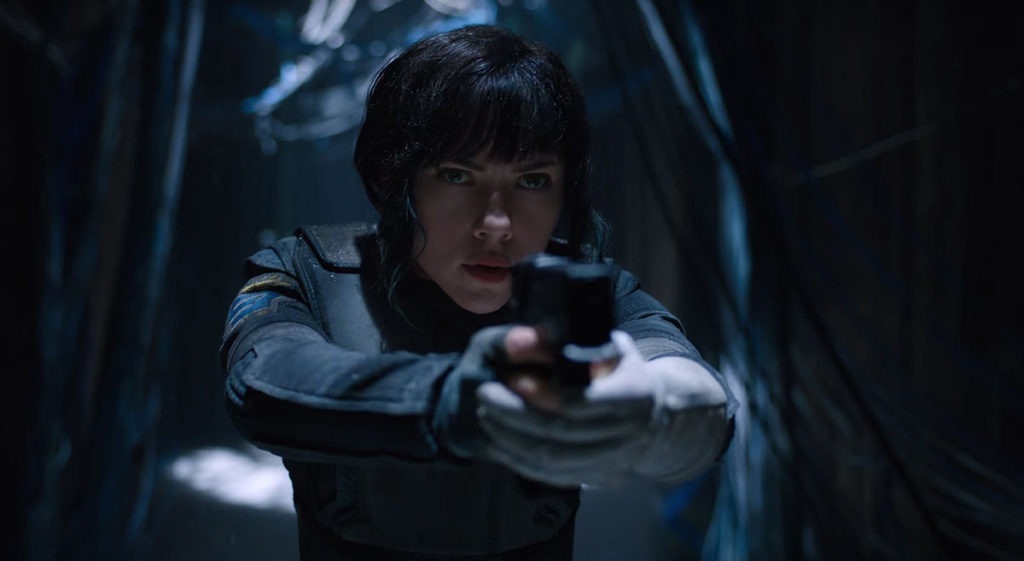Writers: William Wheeler, Jamie Moss, Ehren Kruger (screenplay), Masamune Shirow (manga), Kazunori Ito (1995 movie)
Cast: Scarlett Johansson, Pilou Asbæk, Takeshi Kitano, Juliette Binoche, Chin Han, Peter Ferdinando, Danusia Samal, Michael Pitt, Rila Fukashima
Cert: 12
Running time: 107 mins
Year: 2017

What’s the story: In New Port City, a Far Eastern metropolis of the future, Major (Johansson), a human brain planted into a cyborg shell after a terrorist attack, is a front-line soldier in the city’s counter terrorism unit. A cyberhacker killing high ranking personnel at technology company Hanka is her greatest threat to date.
What’s the verdict: Mamoru Oshii’s 1995 anime Ghost in the Shell, based on Masamune Shirow’s manga, hit Hollywood influencers with a double-barrelled wallop of hi-tech weaponry and hi-brow philosophy.
James Cameron was a quote-on-the-poster fan. When pitching The Matrix, the Wachowskis used a DVD of the film to show what they had in mind.
A Hollywood remake has been a long time coming, with directors including Steven Spielberg failing to crack the code. The gig finally went to London-born Rupert Sanders, who has only the underwhelming Snow White and the Huntsman on his feature film CV.
Happily, Sanders delivers. Ghost in the Shell fans are likely to breathe a sigh of relief… if they agree with how the plot handles the whitewashing allegations. We thought it interestingly done, but a thousand internet rant-pieces are going to differ. It’s spoilery, so we won’t get into it now.
And, for a major studio wanting a franchise starter, there is no better casting than Scarlett Johansson in the lead. More on her later.
Sanders opts for the meditative tone of the original anime, placing his film alongside the philosophical cyber-noir of Blade Runner, rather than aping the fibre optic rush of The Matrix. RoboCop and Nolan’s Batman series are amongst others in the data stream.
Aware of his cinematic lineage, the director delivers a visually awe-inspiring futureworld. An opening aerial swoop through New Port City, chockablock with skyscraper sized holograms, to Major perched atop a luxury hotel is a delicious sensory overload.
Resisting over-amping the action, Sanders sticks close to the original in the gunplay sequences. An opening shoot-out and later spider-tank confrontation are largely faithful to the anime. Although the opening ups the ante with memorable, malevolent robot geisha (performed by The Wolverine star Rila Fukashima) lifted from the Ghost in the Shell sequel, 2004’s Innocence.
But, it may have been wise to include a large-scale action scene. One element absent from Ghost in the Shell 2017, and which audiences will understandably want, is a knockout sequence of ballistic mayhem.
Most however will be bowled over by the bleeding-edge images. A generous helping of God’s eye views of the sprawling megalopolis are sprinkled throughout. At street level the set and location design (this was filmed in New Zealand and China, with Weta delivering the ambitious FX) equally teems with detail. Characters sport imaginative, often grotesque cyber-enhancements to the face and body, while around them the world is a riot of visual noise.
Plotwise, this is a traditional detective tale, writers William Wheeler and Jamie Moss (and polisher Ehren Kruger) clearly under orders to straighten out the willfully opaque original.
Major’s Section Nine team follow leads to discover who is murdering Hanka’s leading scientists and why. The Major investigates her mysterious past via memory fragments (making this a superhero origins story to boot).
Chief amongst her team is Danish actor Pilou Asbæk’s broad-shouldered, protective Batou, played with gruff machismo and winning vulnerability. Batou too has a mini-origins story, the film revealing how he came by those cybernetic peepers.
Major’s alt-right baiting team also sports Singaporean Chin Han, Brit-born Kurdish Pole Danusia Samal and Japanese legend Takeshi Kitano as the Chief. The latter gets a rain-soaked shoot-out evoking his yakuza movie past, topped with a killer punchline.
Juliette Binoche deploys her broad smile to charming effect as a conflicted scientist who pieced The Major back together again, while Brit Peter Ferdinando gets an overdue big-budget gig as Hanka’s shifty CEO.
Even the supporting American casting seems perverse. Indie darling Michael Pitt is hardly a bankable star, but lands a key role as a shadowy puppet master hacking the minds of those wired into the grid.
But, Scarlett Johansson, who has become a bona fide reason to go to the movies, owns the film. Unknowingly, she’s been prepping for this movie with such arresting/bonkers sci-fi fare as Lucy, Under the Skin and Her. Here she brings that same unsettling etherealness, toughness and tenderness, and along with Black Widow has nailed another icomic character.
Those crying whitewash will never be convinced. Interesting to note though the original Major (name changed from Motoko Kusanagi to Mira Killian for this movie) was designed noticeably Western-looking.
Johansson more than carries the movie and although this is no guaranteed hit, you are left hoping for at least one more trip to the virtual wonderland.
Rob Daniel
Twitter: rob_a_Daniel
Like this review? Try out The Electric Shadows Podcast available now for subscription on iTunes or here.
[youtube id=”Q8S7_ZY8Y0k”]





